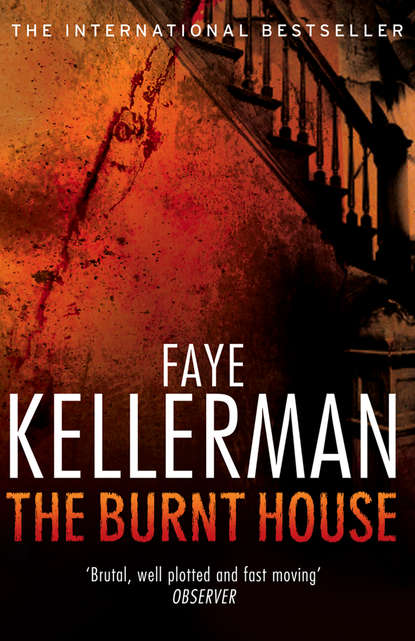По всем вопросам обращайтесь на: info@litportal.ru
(©) 2003-2025.
✖
The Burnt House
Автор
Год написания книги
2019
Настройки чтения
Размер шрифта
Высота строк
Поля
She smiled. “Joe has this saying. If you don’t treat every call like it’s your first, it could be your last.”
“He is so right. If you’re feeling too comfortable, you let your guard down.”
“I’m careful. And it’s not always routine. Every once in a while, you make a good guess, and because of it, you get another sleaze bucket off the streets.”
“Makes you feel pretty good.”
“Very good, even though most of the time it’s grunt work.”
“That’s being what being a detective is.”
“I would think homicide’s a little more exciting.”
“It is more exciting, even though you get your obvious smoking gun cases. Then you spend lots of time trying to extract a confession.”
“There’s an art to that.”
“Absolutely. But sometimes no matter how skillful, you don’t get what you want. Then you hope forensics will buttress the case. And when that doesn’t work … that’s when it’s really frustrating. The ‘what did I miss?’ second-guessing game. First question is always Did I get the right person? You go through the file over and over, trying to find the magic bullet.”
Cindy said, “How often do you actually find something you missed when you look through an old case?”
“More than you think. The key is to put it away for a while so you review it through fresh eyes. Even with that, I’d say the success rate is maybe … I don’t know. I’d say you have a fifty percent chance that you find something that’ll jump-start something dead in the water.”
“Not a bad baseball percentage.”
“But dismal in murder,” Decker said. “It’s always hard to watch a case go cold. Then there’s the occasional cold case that falls in your lap.” He told Cindy about the sudden appearance of a disinterred body. As he spoke, she listened carefully, adding a word or two at the right spots. If she hadn’t chosen to be a cop, she would have made a hell of a shrink.
She said, “And forensics is sure that the body isn’t the flight attendant?”
“I went down to the Crypt and saw the sets of radiographs myself. So now instead of a solve, I’ve got two open cases.”
“That’s a pisser, but it’s really interesting. Did the apartment building have a basement?”
“No, it was a typical California building: wood-framed stucco, no basement.”
“What about subterranean parking?”
“I believe it had a lot in the back … built in days when land was a lot cheaper. I’m remembering it as one parking space per unit and the rest was street parking.”
“And how many units did the building have?”
“Fifteen. Why do you ask?”
“You said the body was found above the foundation.”
“I don’t think I said yes or no. Why do you ask?”
“Back then, didn’t they build lots of Southern California buildings with crawl spaces between the subfloor and the foundation?”
“I would say yes. The earthquake codes were different. They don’t do that anymore. Usually the subfloor is attached to the foundation.”
“But in the older buildings, that’s where they put the plumbing, right?”
“Yeah, they’d put the sewer lines down there, especially if the building was multistoried.”
“You should find out if the building had a crawl space. It would be a perfect dump for a body since most of the tenants wouldn’t be aware of its existence. Or maybe the person who killed your Jane Doe could have been someone involved with constructing the building.”
“That’s exactly what we’re thinking. We’re looking up the builders as well as the tenants. And all the tradesmen. Plumbers, phone people … pest control.”
“But, Daddy, wouldn’t those people stick out? I mean, if you see a guy walking around your house or apartment, you’re going to ask who it is.”
“And …”
“All I’m saying is that a service guy might feel intimidated dumping a body in a building. He might be scared that someone would see him poking around. I’m thinking that anyone who would dump a body into the crawl space has to feel he wouldn’t attract attention.”
“That’s a very good point,” Decker told her. “So running with your idea, maybe we’re dealing with a janitor or super or maintenance guy who lived in the building. No one would think twice about seeing him getting dirty, hauling out trash, or poking around the insides of a building.”
“When in doubt, look at the maintenance man,” Cindy teased him. “I’ve watched enough of those crime-reconstruction shows to know it’s always the janitor.”
Decker smiled. “I’ll tell someone on the team to check it out. Good thinking, Detective.”
Cindy felt herself go hot and knew she was blushing. Whenever her father praised her, she felt an inordinate swell of pride. She looked down and pretended to be interested in the dishes. “Who’s primary on the assignment?”
Вы ознакомились с фрагментом книги.
Приобретайте полный текст книги у нашего партнера:
Приобретайте полный текст книги у нашего партнера:











